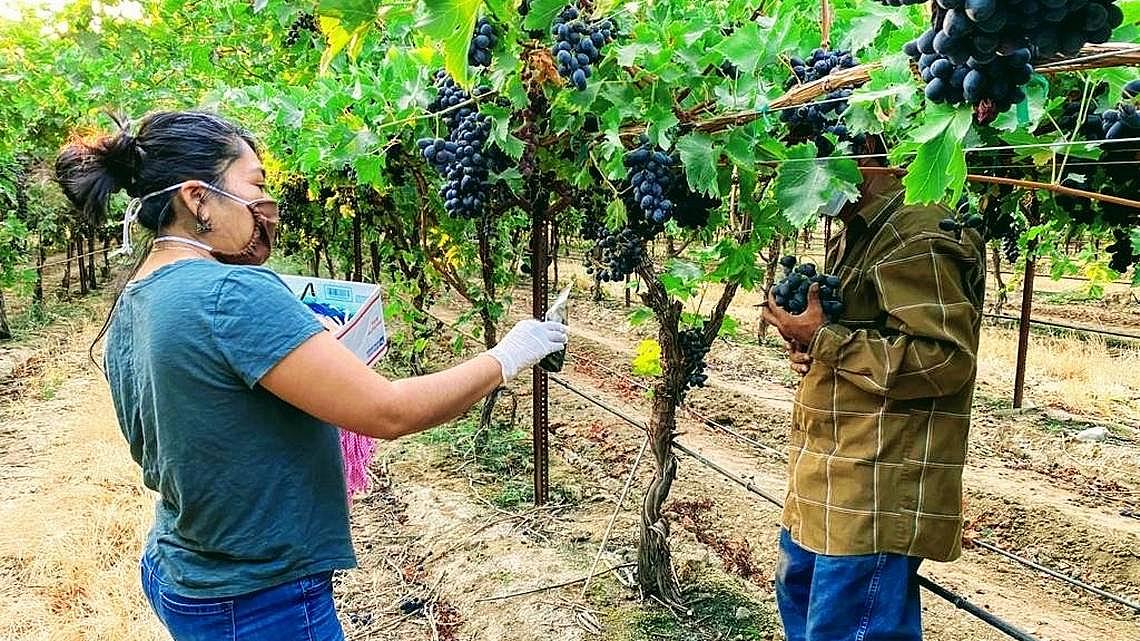Mixteco farmworkers already challenged by diabetes now face threat of COVID variant
This story was produced as part of the USC Annenberg Center for Health Journalism’s 2021 California Fellowship.
Other stories include:
Op-Ed: Indigenous farmworkers are being hit by COVID myths — and deaths
Con diabetes y sin seguro médico: así enfrentan la pandemia de COVID-19 los campesinos de California

Oralia Maceda talks with a Mixtec farmworker and informs him about COVID-19 protection during a visit last year to a vineyard in Madera County. SPECIAL TO THE BEE
CENTRO BINACIONAL PARA EL DESARROLLO INDÍGENA OAXAQUEÑO
Three of my relatives, all Mixteco farmworkers in California, died of COVID-19 last year. As we mourn, we wonder if diabetes played a role in their deaths.
Nearly 30 percent of California’s 800,000 farmworkers are Indigenous. Many face at least a two to four times higher risk for death or severe COVID complications because they suffer from diabetes. For my family and community, saving lives will take more than a new Pfizer pill, which most of us, uninsured, probably cannot obtain. We need deeper solutions to entrenched problems that make up the fabric of my earliest memories.
I remember, as a child, hearing my aunts talk about diabetes when they came from the U.S. to visit our small town in Oaxaca. They spoke of relatives and friends who suffered from the disease — people who picked strawberries in Oxnard, peppers outside Gilroy, or grapes in Madera, where my parents labored for years and where much of my family now lives.
In some cases, diabetes led to heart attack, stroke, blindness and amputations. My aunts didn’t know much about the causes of diabetes, only that it could have to do with high stress and frustration — and drinking too much soda.
My grandparents were migrant farmworkers in Mexico and then California. My grandmother told me she could not afford soda, so she brought coffee to the fields to have the energy to make it through the long work day.
Today, soda can be a status symbol. Farmworkers drink it instead of water to show they rank higher than those who can’t afford it.
I worked in strawberry fields, so I know that workers also guzzle highly sugared, caffeinated drinks for the same reason my grandmother consumed coffee – to have enough energy to endure arduous hours, filling as many produce flats as possible to be able to pay for rent, child care, transportation and food. I saw firsthand what researchers say: that the high rates of diabetes among farmworkers are due to a poor diet linked to long working hours.
Agricultural workers rarely have access to the vegetables and fruit they harvest. Their diet is high in carbohydrates and protein, which increases diabetes risk. Many farmworkers who have the condition don’t know it. Even if they did, they would have little or no access to treatment that would prevent complications. More than 20 years ago, the California Farm Workers Health Survey published Suffering in Silence. It found that 70 percent of farmworkers lacked health insurance; one-third of men working in the fields reported never having attended a medical appointment in their life.
California farmworker health has not improved since then. Three-quarters of farmworkers in the state are undocumented and uninsured, and many suffer from precarious health conditions, according 2015 research by the University of California Merced.
I see this as a form of colonialism: an agricultural system that exploits farmworkers, leaves them to get by on poor diets and denies them basic benefits that would help them stay healthy.
It is long past time to stop the abuse and neglect. As the omicron variant spreads, farmworkers must receive a fair wage and have access to better food and health services, something that is now under serious consideration in Sacramento for those who are undocumented. The pandemic showed us early on that the work of feeding America is essential. The people who do the work must be treated as essential, too.
Arcenio J. López reported this story while participating in the USC Annenberg Center for Health Journalism’s 2021 California Fellowship. It was also produced with support from Ethnic Media Services. Lopez is executive director of Mixteco/Indígena Community Organizing Project, which is based in Oxnard.
[This article was originally published by Fresno Bee.]

